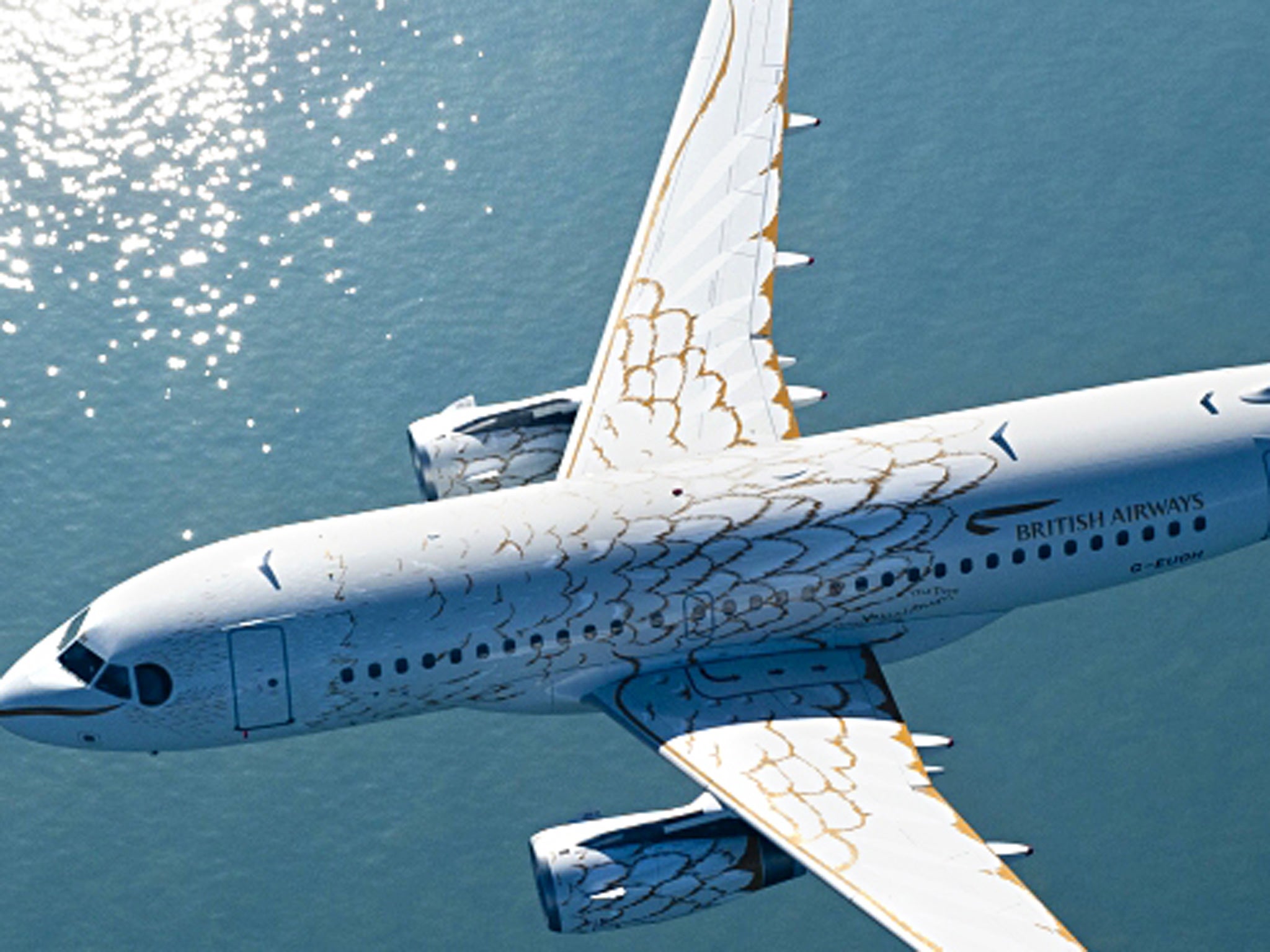Simon Calder: No medals for the golden Dove on a flight to Olympus
The man who pays his way

Perfectly rationally, most people turn up at airports way too early. That is terrific for the shops and cafés, but irksome for the passenger. We do it, of course, because the penalty for arriving late is so harsh. Suppose you have a typical ticket on the average airline. If a traffic snarl-up or a late train means you reach check-in or the gate one minute after the airline's deadlines, you lose your entire fare – or even more, if you opt for a later departure and spend a multiple of what you originally paid. That is 100 per cent or more: a disproportionate penalty.
To minimise the risk of encountering that dismal downside I arrived at Gatwick before 6am with my 8.30am flight to Thessaloniki (see this week's 48 Hours). The only sight of note was a gold-painted Airbus A319, tucked into the corner of the airfield – one of the seven gilded jets that British Airways decorated in the "Dove" livery for the Olympics. As fortune would have it, this plane turned out to be the plane deployed for the flight to Greece's second city, passing close to Mount Olympus. The jet, though, was not about to set any records. Boarding began at the time we were due to leave, and finished 20 minutes after the departure time. The airline ventured neither an explanation nor an apology.
Then the pilots spotted a problem with a cargo door, which took another 10 minutes to address. Given the recent experience with unlatched engine panels on another BA Airbus A319, I appreciate it is a good idea to get everything properly secured before take-off.
With no significant transfer traffic at either end of the flight, the airline would not be concerned about potentially expensive missed connections. And I understand that the crew may have been in no great hurry, since going to Greece and straight back was their only duty of the day; they, unlike us, could not look forward to a warm afternoon on the Thermaic Gulf.
Half an hour, you might say, is neither here nor there: it slimmed down my stay in Greece by only a couple of per cent. But the airline's disinclination to get the passengers aboard an airworthy plane by the promised time of departure meant we all lost 30 minutes of a glorious Greek afternoon (and arrived after the airport tourist office, the only one in the city that opens on Saturdays, had closed for the day).
The delay made no difference to BA beyond the intangible risk that next time a time-pressed passenger might choose a more punctual airline. Yet had the wait extended to three hours, it would have triggered a leap from zero compensation to €400 – twice as much as I paid for the flight. Under the EU261 compensation rules, a delay of three hours for a European flight of over 1,500km triggers that jackpot. It looks just as harshly disproportionate as the penalty a passenger pays for turning up a minute late.
International rescue
The European politicians who devised the compensation rules insist that the system is designed to incentivise airlines to keep to schedule. But it doesn't work. The unintended consequence is that carriers can appear relaxed about delays until the three-hour limit approaches. Then, should the deadline be breached, they subsequently fight the resulting claims from passengers tooth and nail.
A more equitable solution for both travellers and airlines is to penalise avoidable delays proportionately: obliging the airline to hand 10 per cent of the fare paid for every hour that the plane is unnecessarily late. After an hour, the airline hands back 10 per cent; after two hours, 20 per cent; and so on, until the 10-hour mark when all fly free. My minor delay would not qualify, but perhaps the scheme would encourage the airlines to deliver the product they sell.
No doubt the industry will insist this system would be unworkable – but in these online days, the airline knows my fare and the card I used to pay it, so refunds would be straightforward. It would prove more efficient and less expensive than the present airline bureaucracies apparently devoted to defeating claims for delays over three hours. In return for accepting reduced compensation, we passengers should have the right to pay a modest "rescue fee" for a seat on the next available flight – easyJet's £60 charge for anyone who turns up at the airport within two hours after the original flight departed looks a fair figure.
Farewell to frills
Back on board the tardy flight to Greece, we witnessed one frequent flyer getting an upgrade to Club Europe due to the economy section being full. Yet it seemed to be the least enviable upgrade in the history of aviation. The theatrical curtain that separates the classes was missing (or at least not deployed), so those of us in the back of the Airbus could see how the high-density seating extended all the way to the front. We also saw the catering that the well-heeled passengers were offered. The opportunity to quaff champagne at 10am didn't look worth the extra Air Passenger Duty (£13), let alone the £112 extra that British Airways has been asking for Club class for today's flight to Thessaloniki.
Across Europe, the frills are vanishing. From tomorrow, SAS abandons business class on short-haul flights. At the start of July, Lufthansa does the same on all but its Frankfurt and Munich services. I predict that BA may soon erase Club Europe from its Gatwick operation.
Subscribe to Independent Premium to bookmark this article
Want to bookmark your favourite articles and stories to read or reference later? Start your Independent Premium subscription today.

Join our commenting forum
Join thought-provoking conversations, follow other Independent readers and see their replies